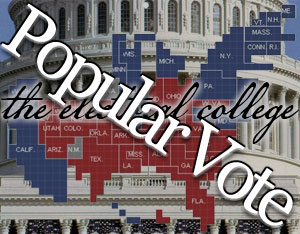Along with a short but growing list of other states, New York has now officially joined the National Vote Compact by deciding to award its 29 electoral votes “in any manner it deems appropriate.” This would allow the transition to a national popular vote once enough states pass similar measures.
Report from the National Journal:
On Monday, Gov. Andrew Cuomo signed legislation that adds New York to the roster of states in the National Popular Vote compact.
The law allows New York to award its 29 electoral votes “in any manner it deems appropriate,” under Article II of the Constitution. Cuomo has pledged New York to give those votes to the candidate who wins the national popular vote. Currently, New York awards its electoral votes to the candidate who wins the state’s popular vote.
So far, nine other states and the District of Columbia have signed on to the National Popular Vote compact. Unfortunately for popular vote advocates, this sort of legislation does not actually take effect until enough states—representing a majority of the Electoral College’s 538 votes—pass similar laws. Ironically, popular-vote advocates have to win over the Electoral College before they can dismantle it.
As a refresher from your high school civics class, here’s how the Electoral College works: Instead of tallying up every vote during the presidential election and declaring a winner that way, the U.S. uses “electors,” or delegates who vote for the candidate who wins in their state. The number of electors in each state varies by the number of congressional districts each state has. In almost every state, electors pledge their votes to the candidate who wins their state’s popular vote.
Other states in the compact, besides the District of Columbia, include Rhode Island, Vermont, Maryland, Washington, Illinois, New Jersey, Massachusetts, California, and Hawaii. As of Tuesday, add New York to the list.
This is a fairly touchy subject in my opinion. There are valid arguments on each side of the issue whether you favor keeping the current system in place or switching to a popular vote model.
This likely isn’t going to happen by 2016 since there are still large factions which oppose such a move but support seems to be somewhat bipartisan. What side do you fall on in this debate? Is one method more or less susceptible to fraud?
Donate Now to Support Election Central
- Help defend independent journalism
- Directly support this website and our efforts
